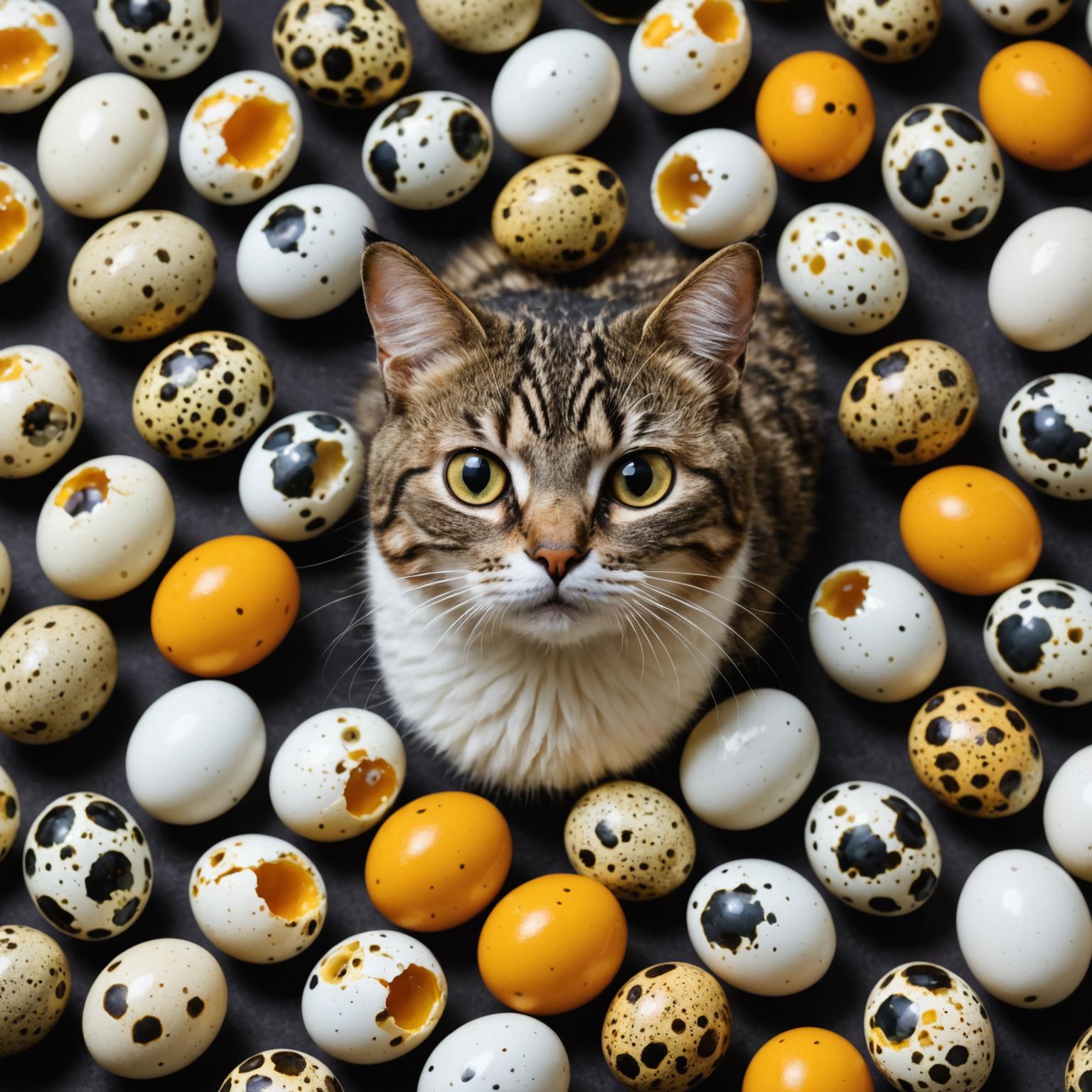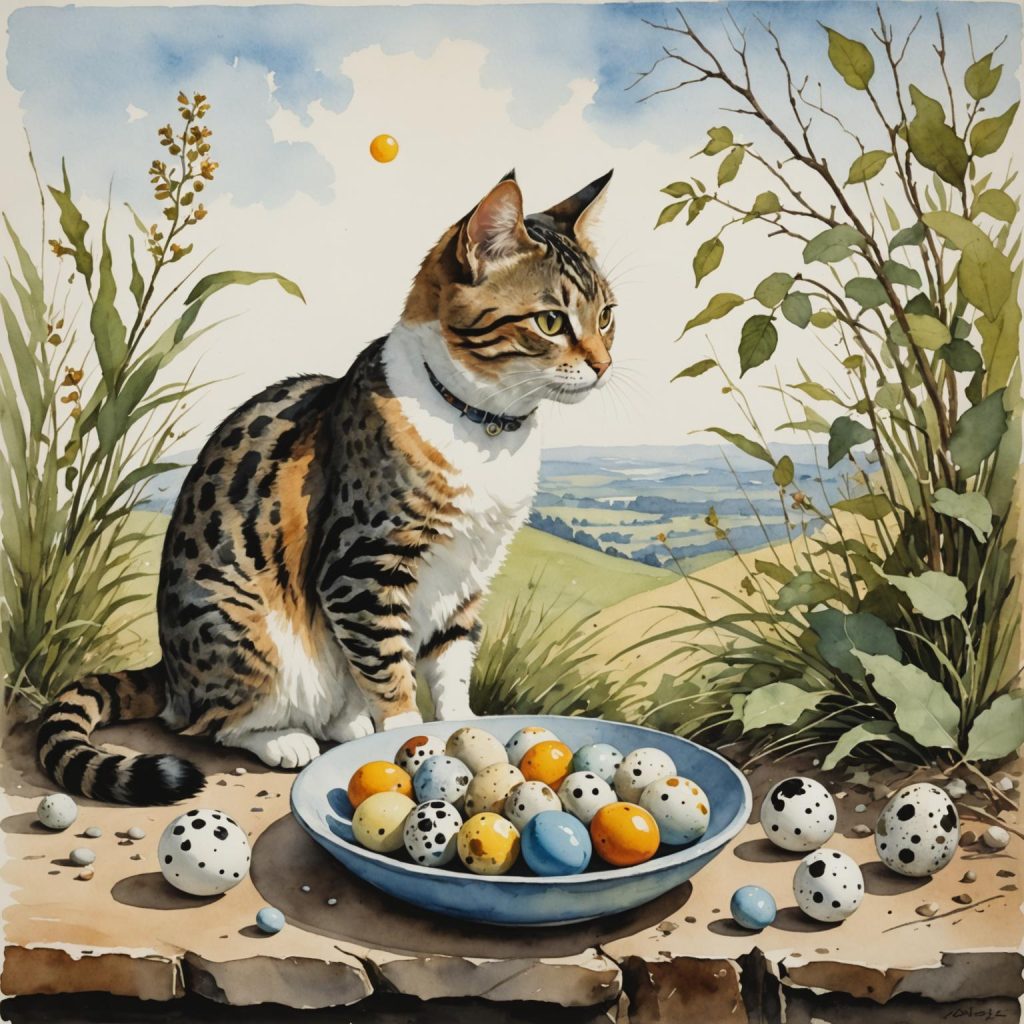quail eggs have long been touted as a nutritious and protein-rich addition to any diet. But when it comes to our feline friends, can they indulge in the raw delicacy as well? Let’s dive into the world of raw quail eggs and see if they’re safe for our beloved cats to enjoy.
Table of Contents
- 1 Introduction: Exploring the Health Benefits of Raw Quail Eggs for Cats
- 2 Nutritional Value of Raw Quail Eggs: An Ideal Addition to Your Cats Diet
- 3 Potential Risks and Precautions When Feeding Cats Raw quail Eggs
- 4 Tips for Safely Incorporating Raw Quail Eggs into Your Cats Meal Plan
- 5 Q&A
- 6 Key Takeaways
Introduction: Exploring the Health Benefits of Raw Quail Eggs for Cats
Raw quail eggs are a nutritious and healthy option for cats to consume. Quail eggs are small in size, making them easy for cats to eat and digest.They are packed with essential nutrients that can benefit your feline friend in various ways. From promoting a shiny coat to boosting their immune system, raw quail eggs offer a range of health benefits for cats.
One of the key benefits of feeding raw quail eggs to cats is their high protein content. Protein is essential for cats’ overall health and well-being, as it helps to build and repair tissues, muscles, and organs. Along with protein, raw quail eggs are also a good source of vitamins and minerals such as Vitamin A, Vitamin B12, Iron, and Riboflavin. Thes nutrients can support your cat’s immune system, aid in digestion, and contribute to their overall health.
Nutritional Value of Raw Quail Eggs: An Ideal Addition to Your Cats Diet
Raw quail eggs are indeed an ideal addition to your cat’s diet due to their high nutritional value. These small eggs are packed with essential nutrients that can benefit your feline friend in various ways.
Quail eggs are a rich source of protein, which is crucial for muscle growth, repair, and overall health. They also contain vitamins such as vitamin A, B12, and riboflavin, as well as minerals like iron and selenium. Additionally, raw quail eggs are easy for cats to digest, making them a great choice for pets with sensitive stomachs.
Here is a breakdown of the nutritional value of raw quail eggs:
| Nutrient | Amount per 1 egg |
|---|---|
| Protein | 5 grams |
| Vitamin A | 244 IU |
| Vitamin B12 | 0.76 mcg |
| Iron | 1 mg |
| Selenium | 14.8 mcg |
With all these benefits, it’s clear that raw quail eggs can be a nutritious and tasty addition to your cat’s diet. Just be sure to introduce them gradually to monitor any reactions and always consult with your veterinarian before making any critically important changes to your pet’s diet.
Potential Risks and Precautions When Feeding Cats Raw quail Eggs
Feeding your cat raw quail eggs can provide a nutritious boost to their diet,but it’s important to be aware of potential risks and take necessary precautions. Raw eggs can contain bacteria such as Salmonella, which can be harmful to both cats and humans if ingested. To minimize this risk, make sure to source your quail eggs from a reputable supplier and always handle them with care.
It’s also important to consider your cat’s individual dietary needs and any existing health conditions before introducing raw quail eggs into their diet. While eggs can be a good source of protein and essential nutrients for cats, some cats may have allergies or sensitivities to eggs. Monitor your cat for any signs of digestive upset or allergic reactions after feeding them quail eggs, and consult with your veterinarian if you have any concerns.
Tips for Safely Incorporating Raw Quail Eggs into Your Cats Meal Plan
When it comes to incorporating raw quail eggs into your cat’s meal plan, there are a few important tips to keep in mind to ensure their safety and well-being. Raw quail eggs can be a nutritious addition to your feline friend’s diet, but it’s important to take precautions to minimize the risk of any potential health issues.
One critically important tip is to always source high-quality quail eggs from a reputable supplier to ensure they are fresh and free from any contaminants. Additionally, it’s crucial to properly handle and store the eggs to reduce the risk of foodborne illness. Here are some tips for safely incorporating raw quail eggs into your cat’s meal plan:
- Always wash your hands before handling the eggs
- Store the eggs in the refrigerator and use them within a week
- Crack the egg open and inspect it before feeding it to your cat
- Consider mixing the raw quail egg into your cat’s regular food for added nutrients
Q&A
Q: Can cats have raw quail eggs?
A: Yes, cats can eat raw quail eggs as they provide a great source of nutrition for our feline friends.
Q: What are the benefits of feeding cats raw quail eggs?
A: Raw quail eggs are packed with protein, vitamins, and minerals that can help improve cats’ overall health and wellbeing.
Q: Are there any risks associated with feeding cats raw quail eggs?
A: While raw quail eggs are generally safe for cats to consume, there is a small risk of foodborne illnesses such as salmonella. It is indeed critically important to source fresh, high-quality eggs and ensure they are properly handled and stored.
Q: How should raw quail eggs be prepared for cats?
A: Quail eggs can be served raw or lightly cooked. Some cats may prefer them mixed in with their regular food, while others may enjoy them as a standalone treat.
Q: How frequently enough can cats have raw quail eggs?
A: Raw quail eggs can be given to cats as an occasional treat or as part of a balanced diet. It is best to consult with a veterinarian to determine the appropriate portion size for your furry friend.
Q: Are there any signs that indicate a cat may be allergic to quail eggs?
A: Some cats may be allergic to eggs, including quail eggs. Signs of an allergic reaction may include vomiting, diarrhea, or skin irritation. If you suspect your cat is allergic to quail eggs, it is best to avoid feeding them to your pet and consult with a veterinarian.
Key Takeaways
it is important to consider the potential risks and benefits of feeding your cat raw quail eggs. While they can provide a nutritious boost to your feline friend’s diet, there is a potential for bacterial contamination that could pose health risks. It is always best to consult with a veterinarian before incorporating any new food into your cat’s diet. Remember, their health and well-being should always come first.Thank you for reading and we hope this article has provided you with valuable information on this topic.
Meet Walter, the feathered-friend fanatic of Florida! Nestled in the sunshine state, Walter struts through life with his feathered companions, clucking his way to happiness. With a coop that’s fancier than a five-star hotel, he’s the Don Juan of the chicken world. When he’s not teaching his hens to do the cha-cha, you’ll find him in a heated debate with his prized rooster, Sir Clucks-a-Lot. Walter’s poultry passion is no yolk; he’s the sunny-side-up guy you never knew you needed in your flock of friends!







